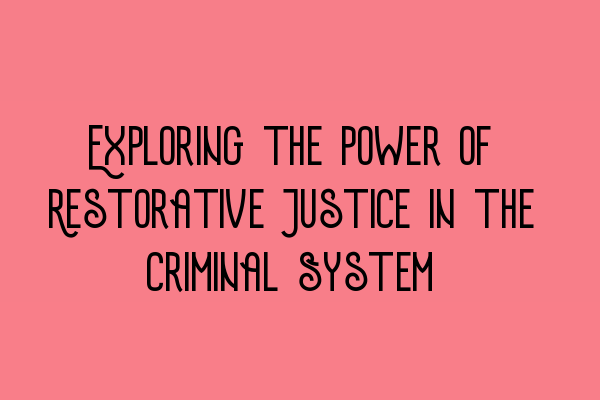Exploring the Power of Restorative Justice in the Criminal System
As the legal landscape evolves, new methodologies emerge to address the challenges faced by the criminal justice system. One such approach that has gained significant momentum is restorative justice. Restorative justice focuses on repairing harm caused by crime by involving all stakeholders in a collaborative process. In this blog post, we will delve into the power of restorative justice and its potential to transform the criminal system.
Understanding Restorative Justice
Restorative justice is a victim-centered approach that emphasizes healing and reconciliation. Rather than simply punishing offenders, restorative justice seeks to address the underlying causes of criminal behavior and empower victims to have a say in the resolution process.
In a restorative justice framework, offenders are encouraged to take responsibility for their actions and engage in meaningful dialogue with their victims. This process allows victims to express the impact of the crime on their lives and for offenders to understand the consequences of their behavior.
By involving all parties, including community members and relevant professionals, restorative justice fosters a sense of accountability and collaboration. It offers an alternative to traditional court proceedings, promoting a more holistic and transformative approach to justice.
The Benefits of Restorative Justice
Restorative justice offers numerous benefits for all parties involved. For victims, it provides the opportunity to be heard, to receive answers to their questions, and to obtain a sense of closure. It allows them to regain control over their lives and enables healing and emotional well-being.
For offenders, restorative justice offers a chance for rehabilitation and personal growth. By actively engaging in the process, offenders are confronted with the consequences of their actions, making them more likely to recognize and address their harmful behavior. It promotes empathy and a deeper understanding of the impact of crime on individuals and communities.
Furthermore, restorative justice has wider societal benefits. By addressing the root causes of crime and promoting rehabilitation, it has the potential to reduce reoffending rates. It also fosters community engagement, strengthening social bonds and creating a sense of shared responsibility.
Implementing Restorative Justice
While restorative justice has gained recognition for its transformative potential, its widespread implementation is still a work in progress. However, its adoption in certain jurisdictions has yielded promising results.
In order to fully explore the power of restorative justice, it is essential to invest in training and education for legal professionals. By equipping lawyers, judges, and practitioners with the necessary skills and knowledge, we can ensure the successful integration of restorative justice principles into the criminal justice system.
Law firms and legal training providers, such as SQE Criminal Law & Practice Law UK, offer comprehensive preparation courses, such as SQE 1 Practice Exam Questions and SQE 1 Practice Mocks FLK1 FLK2, to help professionals adapt to the changing legal landscape. Additionally, advanced courses such as SQE 2 Preparation Courses and SQE 1 Preparation Courses equip legal practitioners with the necessary skills to handle restorative justice cases effectively.
The Future of Restorative Justice
As the concept of restorative justice gains traction, it is crucial to continue research and evaluation to refine its implementation. By exploring its potential, addressing challenges, and building on success stories, we can contribute to the growth and advancement of restorative justice in the criminal system.
Furthermore, staying up to date with important dates, such as the SRA SQE Exam Dates, ensures that legal professionals are well-prepared and ready to embrace new approaches to justice.
Restorative justice has the power to revolutionize the criminal system, providing a more compassionate and effective alternative to traditional punitive approaches. By embracing this transformative methodology, we can create a criminal justice system that serves victims, empowers offenders, and builds stronger and more resilient communities.
